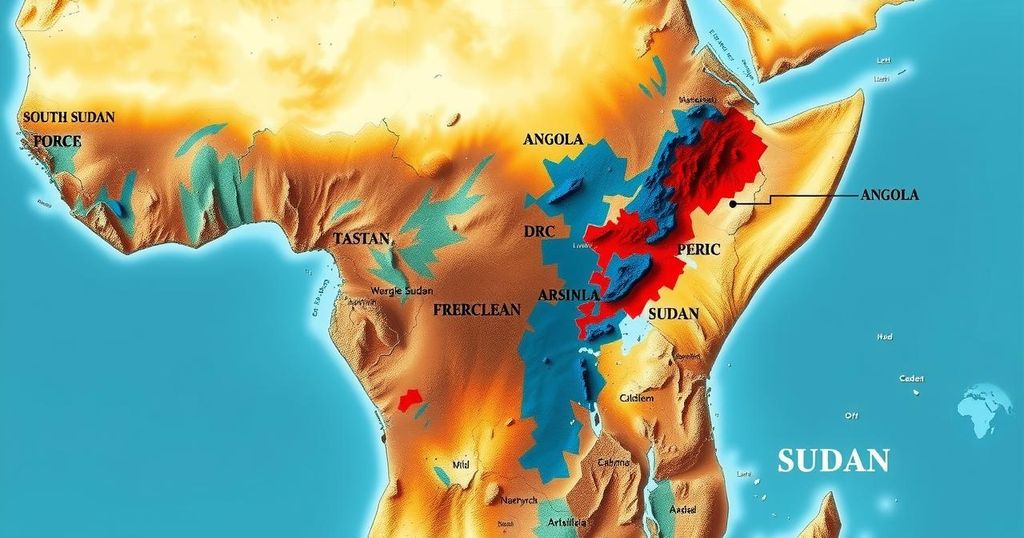Cholera Epidemic in Africa: Death Toll Exceeds 2,400 Amid Dire Circumstances

Cholera deaths in Africa exceed 2,400 as of May 2025, with South Sudan, DRC, Angola, and Sudan most affected. The Africa CDC highlights severe outbreaks and urges for a coordinated response. Access to clean water and sanitation issues complicate control efforts, while lessons from past diseases like mpox are being applied to respond to this crisis.
As of mid-May 2025, the Africa Centres for Disease Control and Prevention (Africa CDC) has reported a serious cholera crisis sweeping across the continent, with deaths exceeding 2,400. The total number of confirmed cases has reached approximately 115,513, raising alarm bells about the ongoing situation. South Sudan, the Democratic Republic of the Congo (DRC), Angola, and Sudan are currently the hardest-hit nations, with South Sudan alone accounting for 848 deaths, the highest of any country in the region.
The propagating cholera outbreaks pose an alarming threat to public health, with deputy incident manager for mpox at the Africa CDC, Yap Boum II, describing the conditions as “severe.” He emphasized that four countries are responsible for a staggering 84 percent of cholera cases this year and 92 percent of related deaths. “South Sudan has recorded the highest number of deaths at 848. Angola and the DRC have also experienced significant loss, with 609 and 513 deaths, respectively,” Boum noted, underlining the catastrophic impact of this disease.
According to the Africa CDC, issues regarding access to clean water significantly fuel the cholera spread. This situation is made worse by the already strained health systems across many African nations. Boum insisted that a coordinated response is essential: “A coordinated regional and continental response is urgently needed to control the spread of cholera outbreaks across Africa.” Plans are being set into motion to contain this epidemic using lessons from previous health crises, particularly the largely controlled mpox outbreaks.
Dr. Ngashi Ngongo, Principal Advisor to the Africa CDC Director General, has announced that strategies utilized in the mpox response would be adapted for cholera control. “Lessons learned from the mpox response, especially the need for close collaboration with other partners, will now be applied to fighting cholera,” Dr. Ngongo asserted, indicating that lessons from past experiences are vital for future efforts.
Between January 2024 and March 2025, UNICEF reported over 178,000 cholera cases across 16 eastern and southern African countries, resulting in more than 1,600 deaths. Many of these cases come from areas affected by conflict, most notably Angola, DRC, South Sudan, and Sudan, which together report over 90 percent of the cholera cases. The Africa CDC is striving to replicate its successes through the Incident Management Support Team (IMST), a joint effort with WHO and 26 other partners, including UNICEF and Gavi, the Vaccine Alliance.
Under Dr. Ngongo’s guidance, the IMST is noted for its integrated strategy to tackle various disease outbreaks. He points out the importance of strengthening essential components, such as surveillance and laboratory capacities, to better deal with ongoing public health crises. “We are now strengthening the key pillars like surveillance and laboratory, to make sure that we have enough capacity on the continent to also address other ongoing outbreaks,” he explained, alluding to the evolving strategies being implemented for cholera management.
Despite these efforts, health experts stress that addressing the root causes of cholera, particularly by improving water quality and sanitation, remains critical. Unfortunately, ongoing conflicts and insecurity are major obstacles to advancement in these affected regions. Moreover, Dr. Ngongo underscored the necessity of establishing a stronger regional procurement mechanism for cholera vaccines, highlighting the supply shortages that have plagued efforts to mitigate the situation. The toll of cholera in Africa, running now over 2,400 deaths, calls urgent attention and action from the international community.
As the African toll from cholera continues to rise, strong collective action is essential to address this crisis, with emphasis placed on improving fundamental conditions for health and hygiene, particularly in the hardest-hit countries.
In conclusion, the cholera epidemic in Africa has claimed over 2,400 lives, with South Sudan, DRC, Angola, and Sudan bearing the brunt of the crisis. The Africa CDC has highlighted the need for a coordinated, regional response and thorough strategies derived from previous outbreaks like mpox. Addressing root causes, particularly water and sanitation issues, remains critical. Strengthening health systems and improving access to vaccines are also essential to combatting cholera effectively as the situation develops.
Original Source: eastleighvoice.co.ke








